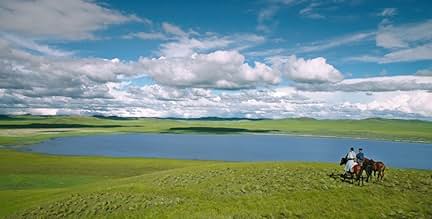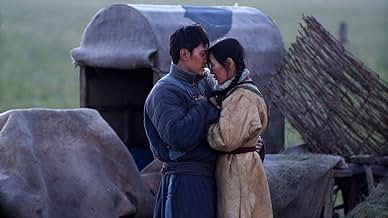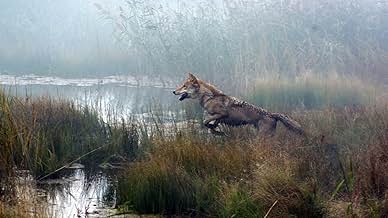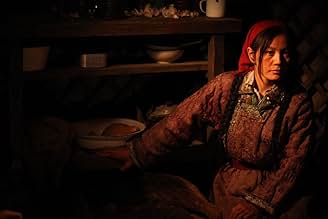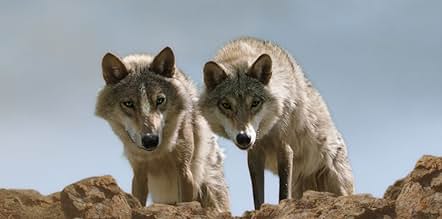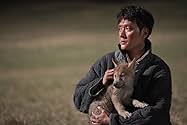Le dernier loup
- 2015
- Tous publics
- 2h 1min
NOTE IMDb
6,6/10
6,4 k
MA NOTE
Pendant la révolution culturelle chinoise, un jeune étudiant urbain est envoyé vivre avec des bergers mongols, où il adopte un louveteau.Pendant la révolution culturelle chinoise, un jeune étudiant urbain est envoyé vivre avec des bergers mongols, où il adopte un louveteau.Pendant la révolution culturelle chinoise, un jeune étudiant urbain est envoyé vivre avec des bergers mongols, où il adopte un louveteau.
- Réalisation
- Scénario
- Casting principal
- Récompenses
- 20 victoires et 16 nominations au total
Ankhnyam Ragchaa
- Gasma
- (as Ankhnyam Rachaa)
Baasanjav Mijid
- Bilig
- (as Basen Zhabu)
Gexige Baoyin
- Batu
- (as Baoyingexige)
Avis à la une
It saddens me that this film will not receive a wider audience. With an English title of "Wolf Totem" very few outside of France or China will be tempted to see it, but it is their loss.
Wolf Totem manages to bring to the big screen the majesty and mystery of wolves. But it is much more than a National Geographic or Animal Planet documentary. (Although those in themselves would be a great success.) It also invites us into the world of Inner Mongolia and tells a compelling tale of human love and loss. This is not Le Renard et L'infant (The Fox and the Child). It succeeds in telling a much grander tale. The acting is all very believable and unlike the usual over-the-top soap opera-esque fare available in most Chinese cinema.
But come for the wolves. I could howl their praises all night long.
Wolf Totem manages to bring to the big screen the majesty and mystery of wolves. But it is much more than a National Geographic or Animal Planet documentary. (Although those in themselves would be a great success.) It also invites us into the world of Inner Mongolia and tells a compelling tale of human love and loss. This is not Le Renard et L'infant (The Fox and the Child). It succeeds in telling a much grander tale. The acting is all very believable and unlike the usual over-the-top soap opera-esque fare available in most Chinese cinema.
But come for the wolves. I could howl their praises all night long.
French filmmaker Jean-Jacques Annaud's China-France co-production is his third enterprise tackling with human-animal equilibrium, after THE BEAR (1988) and TWO BROTHERS (2004), WOLF TOTEM is adapted from a popular semi-autobiographical Chinese novel of the same title and is shot in the majestic Inner Mongolian steppe.
During China's Cultural Revolution, in 1969, two students from Beijing, Chen Zhen (Feng) and Yang Ke (Dou) are assigned to the steppe to teach local Mongolian nomads Mandarin and smooth the process of cultural integration. They are under the aegis of Bilig (Mijid), the head of the nomads, a sage mind who inculcates them the precept of the balanced co-existence between mankind and indigenous wolves. But, a pervading human force of greed and self-seeking would soon disrupt the well-maintained balance, wolves are deprived of their sustenance and during one blizzard night, driven by hunger, they attack a horde of horses and result in great casualty, including Bilig's son (although it is an accident). Retaliation is conducted under the command of an apparatchik (Yin), many wolf cubs are perished for the sake of their skins, but Chen saves one cub, secretly raises it like a pet and attachment grows. As often, one considers him or herself doing a good deed would only realise later in the stage it is a mistake, domesticating a feral wolf isn't something worth commending, and it is noteworthy that Annaud doesn't vindicate Chen's behavior by stating that the cub is bereft or in somewhat danger, Chen's behavior is solely out of his own soft spot, with no regard of the consequence for the cub itself, only after Bilig's sensible advice, Chen would right his wrongs to prepare and train the young wolf for its return to its natural territory, and one should remember, it is always a rookie mistake trying to extract a trickle of humanity out of the wild creatures, mutual connection might be able to achieved, but don't belabor yourself with any illusions of any reciprocal gestures.
The stand-off between humans and wolves will reach its heroic climax after the ravenous wolf pack assails a sheep corral during one night and this time, the entire pack is almost being extirpated by bullets and unrelieved vehicle chase, witnessed powerlessly for Chen, if anything, powerless is the omnipresent feeling, wherever humans tread, there are black sheep undermining the natural grandeur and harmony, disasters are bound to ensue, a central message cannot be dissipated by the film's lugubriously concocted positive vibe in the end. It is a big relief Annaud doesn't settle for facile wishful-thinking or radical aggression in its tonality, so that the film manage to retain an organic slant which conforms with his previous similar oeuvres.
The striking animal stunts orchestrated by dexterous trainer Andrew Simpson greatly hone up the set pieces, especially against its ferocious surroundings (the scenes of frozen animal corpses are manifestations of the primordial power of nature), and it goes without saying the film is a continuous landscape-porn (plus two emphatic examples of cloudscape), although sometimes its immaculateness unfittingly instigates the suspicion of an overachieved CGI-preening during the post-production.
The human cast understandably takes a back seat from its awe-inspiring canine counterpart, but the dialogues sound clunky to a Chinese ear, and the character development barely exists, since when Chen and Gasma (Ragchaa), the widow and daughter-in-law of Bilig, become an item? The emphasis is so top-heavy on Chen and his wolf cub, which makes the romantic subplot comes off as abrupt and fluffy. In the main, WOLF TOTEM doesn't shortchange its forte: the spectacular vista and pulsating action sequences, and it also circumspectly bypasses the sensitive political agenda (the film was a mammoth box-office player two years ago during the golden spell of Chinese Spring Festival) and allows the story itself to stimulate reflections on a broader picture: human vs. nature, simply within ecological parameters.
During China's Cultural Revolution, in 1969, two students from Beijing, Chen Zhen (Feng) and Yang Ke (Dou) are assigned to the steppe to teach local Mongolian nomads Mandarin and smooth the process of cultural integration. They are under the aegis of Bilig (Mijid), the head of the nomads, a sage mind who inculcates them the precept of the balanced co-existence between mankind and indigenous wolves. But, a pervading human force of greed and self-seeking would soon disrupt the well-maintained balance, wolves are deprived of their sustenance and during one blizzard night, driven by hunger, they attack a horde of horses and result in great casualty, including Bilig's son (although it is an accident). Retaliation is conducted under the command of an apparatchik (Yin), many wolf cubs are perished for the sake of their skins, but Chen saves one cub, secretly raises it like a pet and attachment grows. As often, one considers him or herself doing a good deed would only realise later in the stage it is a mistake, domesticating a feral wolf isn't something worth commending, and it is noteworthy that Annaud doesn't vindicate Chen's behavior by stating that the cub is bereft or in somewhat danger, Chen's behavior is solely out of his own soft spot, with no regard of the consequence for the cub itself, only after Bilig's sensible advice, Chen would right his wrongs to prepare and train the young wolf for its return to its natural territory, and one should remember, it is always a rookie mistake trying to extract a trickle of humanity out of the wild creatures, mutual connection might be able to achieved, but don't belabor yourself with any illusions of any reciprocal gestures.
The stand-off between humans and wolves will reach its heroic climax after the ravenous wolf pack assails a sheep corral during one night and this time, the entire pack is almost being extirpated by bullets and unrelieved vehicle chase, witnessed powerlessly for Chen, if anything, powerless is the omnipresent feeling, wherever humans tread, there are black sheep undermining the natural grandeur and harmony, disasters are bound to ensue, a central message cannot be dissipated by the film's lugubriously concocted positive vibe in the end. It is a big relief Annaud doesn't settle for facile wishful-thinking or radical aggression in its tonality, so that the film manage to retain an organic slant which conforms with his previous similar oeuvres.
The striking animal stunts orchestrated by dexterous trainer Andrew Simpson greatly hone up the set pieces, especially against its ferocious surroundings (the scenes of frozen animal corpses are manifestations of the primordial power of nature), and it goes without saying the film is a continuous landscape-porn (plus two emphatic examples of cloudscape), although sometimes its immaculateness unfittingly instigates the suspicion of an overachieved CGI-preening during the post-production.
The human cast understandably takes a back seat from its awe-inspiring canine counterpart, but the dialogues sound clunky to a Chinese ear, and the character development barely exists, since when Chen and Gasma (Ragchaa), the widow and daughter-in-law of Bilig, become an item? The emphasis is so top-heavy on Chen and his wolf cub, which makes the romantic subplot comes off as abrupt and fluffy. In the main, WOLF TOTEM doesn't shortchange its forte: the spectacular vista and pulsating action sequences, and it also circumspectly bypasses the sensitive political agenda (the film was a mammoth box-office player two years ago during the golden spell of Chinese Spring Festival) and allows the story itself to stimulate reflections on a broader picture: human vs. nature, simply within ecological parameters.
This movie is based on a semi-autobiographical novel and I think they did a pretty good job in turning a literary piece of art into a cinematic experience. This is one of the reasons I gave this movie 7 stars. Other reasons included great performances (extremely natural and believable), beautiful scenery and the amount of empathy the creatures from this movie were able to develop in me from beginning to end. Of course, all of the creatures except...humans. Ok, you can try to understand them, but if you are a sensitive person you can't help but hate every single character here except the Chinese student who adopted the little wolf. The main character is the only character with a sensitive heart and a pure soul. Yes, there is a little kid from the village, I'm sorry. I studied Chinese language and literature and I spent some time in China while I was a college student, I think this is is a very accurate portrayal of Chinese people, no matter if we are talking about people from big cities or countryside. Unfortunately, it is very difficult to find a highly sensitive Chinese person. They can be wise and smart, but they are practical and cruel. And I couldn't enjoy the movie. Being a huge animal lover, my heart was shaking all of the time. The scenes are highly graphic, brutal and disturbing. I agree that these types of movies are necessary for us to raise our awareness about many things that happen between men and animals and to try to change and improve the relationship somehow. I liked the ending scene because in a certain way it blended sensitivity with "coldness", wild warrior spirit of the wolf was compared with still naive and culturally embedded spirit of the young Chinese student and they did that in a strong and emotional way. (I am not a native English speaker, so please don't laugh if something sounds strange in this review ;) ). All in all, I think that people who really love animals will have a really hard time while watching this movie.
I know the name of Jean-Jacques Annaud from The Bear, a movie that made his name a lot more memorable to me than The Name of the Rose, another movie I loved and that he directed. In The Bear, the main character was a little bear cub and any humans in the film were mere secondary characters. The things that film did with animals was nothing short of miraculous.
In this Chinese-French coproduction, there are a lot of wolves and talk about wolves and people getting angry about wolves or loving them, but they are not the main characters. Relegated to the subject of a conversation, wolves play a minor part in this film that doesn't seem to know what it wants to be. It shows a little bit of Chinese Cultural Revolution, but not enough to be of any relevance or warrant the wrath of Chinese authorities. It shows the free way of the Mongols living in the steppes, but it doesn't go in depth. It shows some beautiful wolves, but most of the time they just look pretty and don't do much. It shows men in love with women, but it never goes into romance territory. It shows city boys being schooled in the ways of the steppe, but it doesn't really make anything of it.
The acting was good and so was the direction, I guess. The wide views of the green steppe were beautiful (until the mosquitoes arrived). Yet most of the time is seemed like a fairy tale, lacking a truth that I am not aware of, but that felt like it should be different.
It is not that I didn't like the film, but after two hours of going back and forth between genres, alternating between hating the Communist director who doesn't understand the life of the land and hating just about everybody else for their pretentious stupidity, I was actually bored.
In this Chinese-French coproduction, there are a lot of wolves and talk about wolves and people getting angry about wolves or loving them, but they are not the main characters. Relegated to the subject of a conversation, wolves play a minor part in this film that doesn't seem to know what it wants to be. It shows a little bit of Chinese Cultural Revolution, but not enough to be of any relevance or warrant the wrath of Chinese authorities. It shows the free way of the Mongols living in the steppes, but it doesn't go in depth. It shows some beautiful wolves, but most of the time they just look pretty and don't do much. It shows men in love with women, but it never goes into romance territory. It shows city boys being schooled in the ways of the steppe, but it doesn't really make anything of it.
The acting was good and so was the direction, I guess. The wide views of the green steppe were beautiful (until the mosquitoes arrived). Yet most of the time is seemed like a fairy tale, lacking a truth that I am not aware of, but that felt like it should be different.
It is not that I didn't like the film, but after two hours of going back and forth between genres, alternating between hating the Communist director who doesn't understand the life of the land and hating just about everybody else for their pretentious stupidity, I was actually bored.
Mongols believes in Eternity of Blue sky and idolizing ourselves us like descendants of Wolf and Deer. Just watched a movie 10 mins ago. Feeling is not excited. We Mongolians never built a castle for sheep.Trying to climb a wall, to kill and then skip away was our history. Sorry, but we let them build Great Wall. If they sending message they saved Le dernier Loup, again sorry. Mongol made history before Mao and it will continue. The movie about a wolf is made best with Grey Liam Neeson, by the way, he made also best movie against rulers with his role in Schindler's list. Watch Grey and compare it Le dernier loup. Sorry I should comment and have al right. Last wolf may be make money but not a best foreign movie to be honored Oscar and Canne.
Sorry to say again sorry. Predators were always hunting a weaks, eating babies and surviving though.., survived around here at least 40,000 years. But we didn't aware why we still existed in a land of plenty dinosaur skeleton.
Sorry to say again sorry. Predators were always hunting a weaks, eating babies and surviving though.., survived around here at least 40,000 years. But we didn't aware why we still existed in a land of plenty dinosaur skeleton.
Le saviez-vous
- ConnexionsReferenced in At the Movies: Cannes Film Festival 2013 (2013)
Meilleurs choix
Connectez-vous pour évaluer et suivre la liste de favoris afin de recevoir des recommandations personnalisées
- How long is Wolf Totem?Alimenté par Alexa
Détails
- Date de sortie
- Pays d’origine
- Site officiel
- Langues
- Aussi connu sous le nom de
- Wolf Totem
- Lieux de tournage
- Xilingol Grassland, Inner Mongolia, Chine(major location)
- Sociétés de production
- Voir plus de crédits d'entreprise sur IMDbPro
Box-office
- Budget
- 38 000 000 $US (estimé)
- Montant brut aux États-Unis et au Canada
- 210 591 $US
- Montant brut mondial
- 125 837 070 $US
- Durée2 heures 1 minute
- Couleur
- Mixage
- Rapport de forme
- 2.35 : 1
Contribuer à cette page
Suggérer une modification ou ajouter du contenu manquant

Lacune principale
What is the Brazilian Portuguese language plot outline for Le dernier loup (2015)?
Répondre






